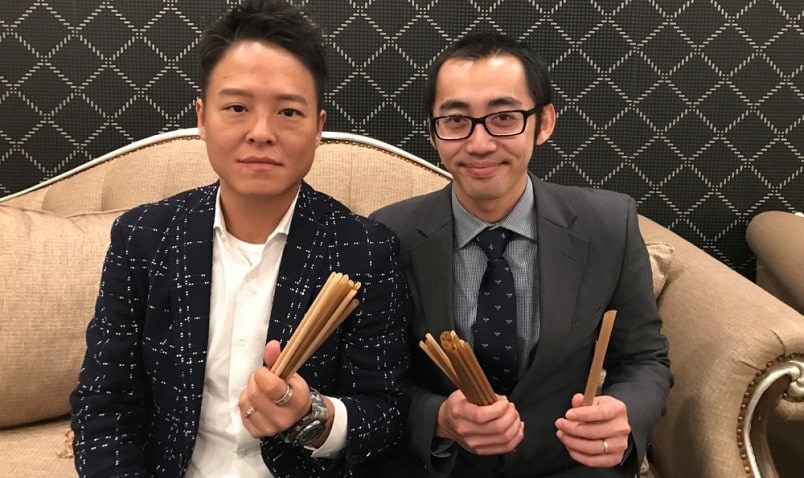As more people and businesses recognize the harm of plastic straws in Canada, and with Vancouver banning them next June, some businesses are getting ready to enter the emerging market with alternative straws.
Two Richmond entrepreneurs said they have found a solution to provide affordable, strong and environmental-friendly straws made of sugarcane.
 Richmond entrepreneurs Roger Chen (left) and Alfie Hsu introduce sugarcane straws to Canada. Photo submitted
Richmond entrepreneurs Roger Chen (left) and Alfie Hsu introduce sugarcane straws to Canada. Photo submitted
Alfie Hsu and Roger Chen are long-time businessmen in Richmond. Always interested in environmental-friendly technologies, the two, who originally came from Taiwan, learned about a new technology developed by Taiwanese company PFTA, to replace plastic using plant-based materials.
“The technology turns plant fibre polymer into an eco-material that can replace 60 per cent of the plastic products,” said Hsu.
“We thought it was such a great technology and wanted to introduce it to Canada."
Their company, Gallop International Trading Ltd., became the Canadian distributor of Taiwan-PFPA.
Hsu explained that this material looks and feels like plastic, but because it’s totally plant based, it can be broken down into water and carbon dioxide in six to eight months.
“It is now mostly made of sugarcane fibre because there are a lot of sugarcane bagasses left in the sugar making process in Taiwan, but the material can actually be made of any plant fibre,” he said.
Not long after introducing it to Canada, Hsu said many straw wholesalers in the country have already shown their interest despite the slightly higher price.
“The plastic straws are sold for about four cents while our ones are 12 cents each. If you look at the percentage, it is a lot more, but the amount of extra money is actually not so much,” said Hsu.
“And many businesses are willing to pay a little bit extra to contribute to the environment by using eco-friendly products.”
The pair is now selling sugarcane straws in three different sizes shipped from Taiwanese headquarters, but plan to open their own factory locally after one year.
“The price will be reduced to be similar to plastic straws at that time,” said Hsu.
He added that apart from straws, the technology can also be used to produce disposable products such as dishes and cups.
“We will explore options to use local materials other than sugarcane, such as blueberries and coffee grounds, to turn local waste into valuable products,” said Hsu.
Chen, who owns two restaurants in Richmond, will open a new bubble tea shop in the city next year, which he said will use only sugarcane straws.
“We will set an example for other businesses in the industry. We have the responsibility to care for our environment,” said Chen.
“Data shows that Canadians throw out about 57 million straws every day. It will make a big difference to the environment by using eco-straws and it’s also a great opportunity for businesses who can offer eco-friendly solutions.”



